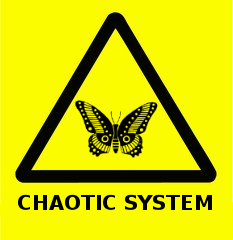Kaos Chaos χάος
Greek χάος means "emptiness, vast void, chasm, abyss", from the verb χαίνω, "gape, be wide open, etc.", from Proto-Indo-European *ghen-, cognate to Old English geanian, "to gape", whence English yawn.[1]
Hesiod and the Pre-Socratics use the Greek term in the context of cosmogony. Hesiod's chaos has often been interpreted as a moving, formless mass from which the cosmos and the gods originated, but Eric Voegelin sees it instead as creatio ex nihilo, much as in the Book of Genesis. The term tohu wa-bohu of Genesis 1:2 has been shown to refer to a state of non-being prior to creation rather than to a state of matter. The Septuagint makes no use of χάος in the context of creation, instead using the term for גיא, "chasm, cleft", in Micha 1:6 and Zacharia 14:4.
Nevertheless, the term chaos has been adopted in religious studies as referring to the primordial state before creation, strictly combining two separate notions of primordial waters or a primordial darkness from which a new order emerges and a primordial state as a merging of opposites, such as heaven and earth, which must be separated by a creator deity in an act of cosmogony.[5] In both cases, chaos referring to a notion of a primordial state contains the cosmos in potentia but needs to be formed by a demiurge before the world can begin its existence.
This model of a primordial state of matter has been opposed by the Church Fathers from the 2nd century, who posited a creation ex nihilo by an omnipotent God.
In modern biblical studies, the term chaos is commonly used in the context of the Torah and their cognate narratives in Ancient Near Eastern mythology more generally. Parallels between the Hebrew Genesis and the Babylonian Enuma Elish were established by H. Gunkel in 1910. Besides Genesis, other books of the Old Testament, especially a number of Psalms, some passages in Isaiah and Jeremiah and the Book of Job are relevant.
Use of chaos in the derived sense of "complete disorder or confusion" first appears in Elizabethan Early Modern English, originally implying satirical exaggeration.
























Comments
Post a Comment